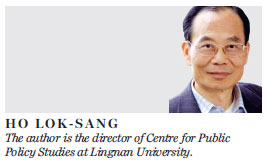There is no need for pessimism in HK
Updated: 2015-06-19 07:35
By Ho Lok-Sang(HK Edition)
|
|||||||||
As expected, the SAR government's constitutional reform package was voted down. Some people had predicted that if the reform package was passed with a small margin and without widespread support, Hong Kong would become ungovernable. Other people also warned that if the reform package was rejected, so much internal strife would continue that Hong Kong could become ungovernable. It appears that either way, according to pessimists, Hong Kong is going down the drain.
But we need not be so pessimistic. Actually, everything boils down to our own attitudes. Our younger generation may not know it, but Hong Kong during the colonial days never had any form of democracy. Prior to the establishment of the ICAC, Hong Kong was also extremely corrupt: It was virtually rotten from top to bottom. But Hong Kong not only survived, it went on to produce an economic miracle. We celebrated the "Under the Lion Rock" spirit. "Under the Lion Rock" was a very successful drama series produced by RTHK portraying the relentless fighting spirit of Hong Kong people against all odds. Since then, corruption has been reduced considerably and other crimes have fallen. Moreover, educational opportunities have greatly expanded. Recreational facilities have been hugely improved, and a fairly comprehensive social safety net is now in place. Hong Kong also has one of the world's largest fiscal reserves. Therefore, being pessimistic does not make sense.
Yet our own attitudes make a big difference. Factionalism, separatist tendencies, the rise of insular attitudes, arrogance, complacency, and now the emergence of violent and uncivil behavior can all ruin the fortunes that our forefathers had built up over the years. Yes, the SAR government's electoral reform package has been defeated. But that is not the end of the world. Rumors to the effect that the central government will punish Hong Kong are groundless. I am confident Beijing will take a business-as-usual attitude to Hong Kong. It will continue to do what is in the best interests of the SAR and the country. It just does not make sense to consider that the central government would "lift a rock to hit at its own feet".
I have little doubt Beijing will keep its promises. The central government is not going to amend the main features of the Aug 31 framework without the SAR experimenting with it. It is well known that Beijing adopts a bold, yet gradualist approach to reform. The bottom line is that even though small changes might be possible, the central government is unlikely to allow anyone to challenge the political system on the mainland. Some form of prescreening will continue to be maintained to uphold national security.
Many skeptics ask: What has prescreening to do with national security? They say the ruling party already has control over troops and sophisticated weapons as well as an effective intelligence system to protect national security. Treason and criminal threats are already protected under existing laws. These skeptics argue that there is no legitimate reason to worry about national security.
But these people do not understand national security in the broader context. Of course, it is unlikely that a Chief Executive who is opposed to the central government could topple the central government, and unlikely that China would be invaded by a foreign power. But Beijing already has to deal with separatist forces in Xinjiang and Tibet. These separatist groups are not strong enough to threaten the sovereignty but they are causing security problems for the mainland. Innocent people have been hurt and even killed. In Hong Kong, the "Occupy Central" movement disrupted people's lives and businesses and caused other problems. Hong Kong people suffered as a result. Therefore, national security has to be seen in terms of protecting its citizens from potential harm. The US is the world's leading superpower, and it is unlikely it would be taken over by another power. But it also has national security concerns.
Hong Kong people need to understand that the CE has to be acceptable to the SAR's people as well as to Beijing. It will be good, in the long term, if more transparent criteria in regard to this could be explained. People need to realize that when people are screened out as potential CE candidates it is for very good reasons. I think this is something we all need to think about and work for.
While it is great to have a political system that is seen to be fair, what is even more important is to uphold the rule of law and freedom of the press. It is the rule of law and freedom of the press that provide effective checks and balances against abuses of power. Regardless of how the future CE is elected or appointed, stopping abuses of power should be our main concern. Regardless of the political system that is adopted, the ability of any individual to influence the outcome of an election is negligible. A member of the electorate has to come to terms with the fact that he or she may be disappointed because his or her preferred candidate may lose the election. But safeguards for press freedom and the rule of law will still protect their basic rights.

(HK Edition 06/19/2015 page12)